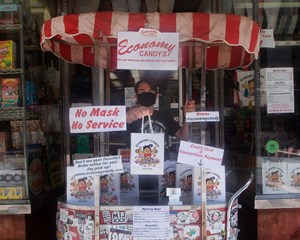Small retailers look for ways to survive the holidays
小零售商們在尋找度過假期的新方
For Mitchell and Skye Cohen, the third-generation owners of Economy Candy in New York City, the short period between Halloween and New Year's is usually the busiest season. The store would serve upwards of a thousand customers in a weekend, when shoppers flocked to the small Lower East Side store to buy candy in bulk for holiday gifts and parties.
米切爾·科恩和斯凱·科恩是紐約市經濟糖果公司的第三代老板。對他們來說,萬圣節和新年之間的短暫過渡期通常是最為繁忙之季。當購物者涌向下東區的這家小商店、為節日禮物和派對購買大量糖果時,這家商店一個周末就能夠接待1000多名顧客。
But this year, the aisles of Economy Candy are uncharacteristically quiet, devoid of their typical crowds of loyal locals and curious tourists. When the COVID-19 pandemic hit New York City in March, the Cohens halted in-person shopping for the first time in the store's 83 years. For a business that has always relied on foot traffic for the majority of its revenue, the decision was tough but necessary: the shop wasn't big enough to keep people a safe distance from one another, and the costs of stocking, staffing and sanitizing far outweighed the profit they'd see if they stayed open. So, for the past nine months, the Cohens have sold their sweets primarily via their website, shipping orders or arranging curbside pickup.
但今年,經濟糖果店的過道卻出奇地安靜,沒有了平日里那些忠誠的當地人和好奇的游客。今年三月份,在新冠病毒襲擊紐約之際,科恩夫婦在該店83年的歷史上首次停止了親自采購。對于一個一直依賴人流量獲得大部分收入的公司來說,這個決定是艱難的,但也是必要的:這家店并不大,無法讓人們保持安全社交距離,而且庫存、員工和消毒的成本遠遠超過了繼續營業的利潤。所以,科恩一家在過去的九個月里主要通過他們的網站、發貨訂單或者安排路邊貨車來銷售糖果。

More than 30 million small businesses in the U.S. are struggling for footing in what should be their busiest quarter. A Visa survey taken in September found that 69% of small businesses still viewed the 2020 holiday season as a top sales opportunity—but retail looks vastly different when a health crisis is both upending the economy and changing the way we shop.
3000多萬家美國小企業在本該是他們最繁忙的季度苦苦掙扎。維薩在9月份進行的一項調查發現,69%的小企業仍認為2020年的假日季會是最大的銷售機會——但當一場健康危機既在顛覆經濟、也在改變我們的購物方式時,零售行業還是大不如前了。
For one thing, spending this year will be lower overall, so while small businesses can expect to see a boost in sales over the winter holidays compared with recent months' sales, it will likely be a smaller uptick than in past years. A September survey by Deloitte found that average retail sales for the year will increase by 1% to 1.5% over the holidays; by comparison, in 2019, that growth was 4.1%.
首先今年的整體支出將下降,因此,盡管與近幾個月相比,小型企業有望在冬季假期看到銷售增長,但增幅可能會小于過去幾年。德勤9月份的一項調查發現,今年的平均零售銷售額將在假期期間增長1%到1.5%,相比之下,2019年的增速為4.1%。
"We found this year that the overall spending per household was going to be down about 7%," said Rodney Sides, Deloitte's vice chairman of U.S. retail and distribution. "People are still spending money, but they're changing how they're spending it and what types of things they're buying. Travel is down, but home decor is up."
德勤美國零售和分銷副主席羅德尼·賽德斯表示:“我們發現,今年每個家庭的總支出將下降約7%。人們沒有停止花錢,但他們在改變花錢的方式和購買的商品種類。旅游方面的支出減少了,但家居裝飾方面的支出卻增加了。”
And in the age of social distancing, online shopping will see a boost. A November McKinsey report found that 37% of consumers will shop more online this holiday season. As a result, many small businesses that may have had little to no digital presence are upping their online offerings.
在這個社交隔離的時代,網購將激增。麥肯錫11月份的一份報告發現,這個假日季有37%的消費者將增加網購。因此,許多原本可能很少或根本沒有數字業務的小企業正在增加其在線業務。
譯文由可可原創,僅供學習交流使用,未經許可請勿轉載。











